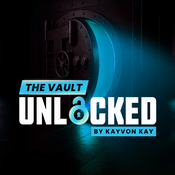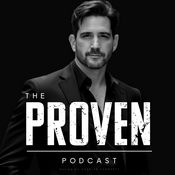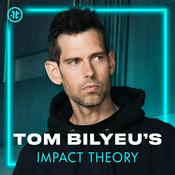Available Episodes
5 of 53
- Avoiding the Culture ShrugSome movies and products flop so badly they become infamous. Others become instant classics. But then there are the ones in the middle. The ones with hype that launch and then disappear without a trace. No cultural impact. No lasting impression. Just a collective… “meh.”This episode examines that dangerous middle ground we’re calling a culture shrug and why, for companies and creators, it can be worse than outright failure.Aaron, Melissa, and Qadira explore why projects that check every box still vanish instantly, how companies misread cultural signals, and what it really takes to make something with staying power in an era where trends can shift on a dime.What we cover • What a “culture shrug” is and why it can be more painful than a flop • Why effort, budget, and talent don’t guarantee cultural relevance • How movies, brands, and products fail when they aim for everyone • What happens when creativity gets diluted by committees • Why companies often misunderstand what audiences actually want • The timing problem between culture speed and corporate speed • How nostalgia, remakes, and algorithms fail to ignite connection • The danger of creative teams being shielded from real cultural insight • Why safety ideas can be instantly forgettable • Why younger audiences don’t react the way companies assume • The power of niche enthusiasm and true believers • How internal culture determines whether bold ideas surviveTHE FIX: How to Avoid the Culture Shrug1. Start with “So what?” If you cannot answer it clearly, the idea is not ready.2. Treat data as input, not instruction Algorithms reveal behavior, not soul, and never the “why now.”3. Test, but don’t sand down the edges Over testing destroys personality and guts.4. Put a trusted tastemaker in charge of final decisions Not a tyrant, not a committee — a clear, culturally aware leader.5. Build emotional stickiness If people don’t feel it, they won’t remember it.6. Re-evaluate cultural resonance throughout long development cycles Eighteen months is a lifetime in cultural terms.7. Find and nurture your early believer community They amplify when the project finally launches.8. Leave room for weirdness The unexpected idea might be the one culture remembers.9. Conduct a pre mortem Write the “if this flopped, here’s why” memo before you build.10. Add delight Great creative work has soul, not just structure.Subscribe for more deep dives where we fix big business problems with fresh perspectives. • Website – www.wefixeditpod.com • Follow us on: Instagram – https://www.instagram.com/wefixeditpod LinkedIn – https://www.linkedin.com/company/wefixeditpod YouTube – https://www.youtube.com/@WeFixedItPod If you liked this episode, don’t forget to subscribe, leave a review, and share it with your friends! Keep listening to find out how we fix companies and put them back better than we found them.See Privacy Policy at https://art19.com/privacy and California Privacy Notice at https://art19.com/privacy#do-not-sell-my-info.--------40:55
- Wendy's "Vanilla" Shakeup: Let's Get Bolder & Back on TopWendy’s was once the fresh, honest, slightly rebellious burger chain. Today it’s stuck between fast food giants on one side and premium burger rivals on the other. Prices match McDonald’s, but the brand isn’t perceived as a value leader. Quality is decent, but not elevated enough to compete with Five Guys or Shake Shack.So what is Wendy’s now?We sit down with Paul Tuscano, former Chief Digital Officer at KFC US, the man behind their massive digital reinvention. He shares insights from decades in QSR, hospitality, and customer experience to break down why Wendy’s is struggling and how to fix it.What we cover• Why Wendy’s lost its lane • Whether Project Fresh will work • The strengths and weaknesses of the Wendy’s menu • How loyalty, kiosks, personalization, and AI can change QSR• Why Wendy’s social media works, but the stores don’t reflect it • Why legacy brands need clarity and simplicity • How to make Dave Thomas relevant to Gen Z • Why culture and franchise alignment matter more than new tech• How Chick fil A wins with consistency, not complexity • A step by step strategy to rebuild Wendy’sThis episode is a must watch for anyone interested in branding, food, marketing, digital transformation, or turning around legacy companies.Guest: Paul Tuscano Former Chief Digital Officer, KFC US LinkedIn: https://www.linkedin.com/in/paultuscano/Subscribe for more deep dives where we fix big business problems with fresh perspectives. • Website – www.wefixeditpod.com • Follow us on: Instagram – https://www.instagram.com/wefixeditpod LinkedIn – https://www.linkedin.com/company/wefixeditpod YouTube – https://www.youtube.com/@WeFixedItPod If you liked this episode, don’t forget to subscribe, leave a review, and share it with your friends! Keep listening to find out how we fix companies and put them back better than we found them.See Privacy Policy at https://art19.com/privacy and California Privacy Notice at https://art19.com/privacy#do-not-sell-my-info.--------48:38
- Humans vs Robots? The Real Future of Work with Dr. Aadeel Akhtar, CEO of PsyonicThis episode explores one of the biggest questions of our time: are robots replacing humans or helping us reach our full potential? We sit with Dr. Aadeel Akhtar, the visionary CEO of Psyonic, whose bionic hand technology is restoring touch for amputees and powering next generation robotics at NASA, Amazon, Google, Mercedes, Meta, and more.Topics include • Are robots a threat or an opportunity • Why most robot replacement headlines are exaggerated • How bionic hands are restoring real human lives • The business responsibility behind automation • How companies can prepare their workforce • Why kids accept humanoid robots faster than adults • How robotics and AI create new careers • Why the future is humans plus robots, not humans versus robotsThis is a human centered, optimistic, grounded, and deeply personal discussion that reframes the future of work.Subscribe for more deep dives where we fix big business problems with fresh perspectives. • Website – www.wefixeditpod.com • Follow us on: Instagram – https://www.instagram.com/wefixeditpod LinkedIn – https://www.linkedin.com/company/wefixeditpod YouTube – https://www.youtube.com/@WeFixedItPod If you liked this episode, don’t forget to subscribe, leave a review, and share it with your friends! Keep listening to find out how we fix companies and put them back better than we found them.See Privacy Policy at https://art19.com/privacy and California Privacy Notice at https://art19.com/privacy#do-not-sell-my-info.--------49:25
- Ticketmaster & Unfixed Price Tactics: What’s The Real Cost?Prices are rising, fees are multiplying, and transparency is disappearing. In this episode, we break down how Ticketmaster, rideshares, airlines, and even grocery stores use surge pricing, hidden fees, and algorithmic pricing to squeeze more out of consumers.Fractional CFO Elaine Bogart joins us to explain the financial mechanics behind these tactics and whether personalized pricing is fair game or a violation of trust. We explore equity, transparency, surveillance pricing, and what it would take for companies to fix their relationship with the public.In This Episode:• The rise of ambiguous and personalized pricing across industries• Why Ticketmaster’s monopoly keeps driving fan frustration• How data-driven pricing risks crossing into digital discrimination• The difference between surge pricing and surveillance pricing• Why transparency and trust are now business essentials• Fixing it: what “fair pricing” could look like for companies and customers alikeKey Takeaways• Transparency is currency. When customers understand the “why,” they tolerate change better.• Algorithmic pricing can deepen inequality if unchecked for bias or demographic profiling.• Profit isn’t the enemy — opacity is.• Trust is an asset that brands can’t afford to lose in the name of short-term gain.GuestElaine Bogart – Fractional CFO | Strategic Finance & Growth AdvisorLinkedIn: https://www.linkedin.com/in/elainebogart/LinksSubscribe for more deep dives where we fix big business problems with fresh perspectives. • Website – www.wefixeditpod.com • Follow us on: Instagram – https://www.instagram.com/wefixeditpod LinkedIn – https://www.linkedin.com/company/wefixeditpod YouTube – https://www.youtube.com/@WeFixedItPod If you liked this episode, don’t forget to subscribe, leave a review, and share it with your friends! Keep listening to find out how we fix companies and put them back better than we found them.See Privacy Policy at https://art19.com/privacy and California Privacy Notice at https://art19.com/privacy#do-not-sell-my-info.--------53:12
- Victoria's Secret Struggles: Uplifting an Intimate EmpireFor many, Victoria’s Secret represented the epitome of femininity, confidence, and glamour. But as our culture shifted toward authenticity and inclusivity, the brand has struggled to evolve. In this episode, we break down how the most iconic lingerie empire dulled its shine, what their attempted rebrand is missing, and what it would take to rebuild trust with today’s consumer.We explore the business, the culture, the fashion, and the future.Is it too late for Victoria’s Secret to reinvent itself? Or is there still power in the fantasy?We break down:● How Victoria's Secret rose to cultural dominance● Why the brand struggled as beauty standards shifted● The competition from Skims, Spanx, and next-gen lingerie brands● The challenges of rebranding when the market has already moved on● What it really means for a company to be inclusive beyond marketing● Why transformation needs to happen internally, not just on the runwayWe also explore the path forward, proposing ways for the brand to honor its heritage while embracing a broader definition of femininity and confidence.This episode is part culture, part business strategy, part brand therapy. Key Takeaways● Consumers today are not just buying products. They want to see themselves reflected and respected.● Performative inclusion will not work. Authenticity requires representation in leadership, design, and decision-making.● The fantasy does not need to disappear. It just has to widen to include a broader spectrum of customers.● Brands that survive cultural shifts are the ones that act proactively, not reactively. Subscribe for more deep dives where we fix big business problems with fresh perspectives. Links• Website – www.wefixeditpod.com • Follow us on: Instagram – https://www.instagram.com/wefixeditpod LinkedIn – https://www.linkedin.com/company/wefixeditpod YouTube – https://www.youtube.com/@WeFixedItPod If you liked this episode, don’t forget to subscribe, leave a review, and share it with your friends! Keep listening to find out how we fix companies and put them back better than we found them.See Privacy Policy at https://art19.com/privacy and California Privacy Notice at https://art19.com/privacy#do-not-sell-my-info.--------42:44
More Business podcasts
Trending Business podcasts
About We Fixed It. You're Welcome.
Armchair quarterbacking isn’t just for sports anymore. We’re taking the same approach to companies: what would you do in their shoes?
Each episode, our lively panel will debate a new issue ripped from the headlines involving a different well-known company. Between our instincts, experiences, and unsolicited opinions, we may just come up with gold.
At the end, we’ll critique ourselves and see how we did.
If we fixed it, you’re welcome!
Look for it in the Fall of 2024. Subscribe to the podcast so you don't miss a single episode!
Podcast websiteListen to We Fixed It. You're Welcome., The Level Up Podcast w/ Paul Alex and many other podcasts from around the world with the radio.net app

Get the free radio.net app
- Stations and podcasts to bookmark
- Stream via Wi-Fi or Bluetooth
- Supports Carplay & Android Auto
- Many other app features
Get the free radio.net app
- Stations and podcasts to bookmark
- Stream via Wi-Fi or Bluetooth
- Supports Carplay & Android Auto
- Many other app features


We Fixed It. You're Welcome.
Scan code,
download the app,
start listening.
download the app,
start listening.











































